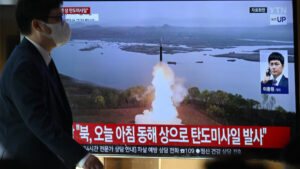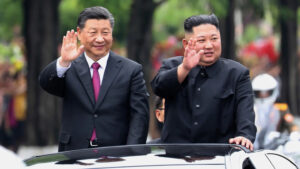World
Hong Kong sentences 45 pro-democracy leaders to prison terms ranging up to 10 years
PUBLISHED November 18, 2024 10:18 p.m. EST

A Hong Kong court sentenced 45 prominent pro-democracy figures to prison terms ranging from four years and two months to 10 years on Tuesday, marking a severe crackdown on nonviolent political activism. The harsh sentences highlight how the city’s legal system has increasingly become a tool of repression, targeting those seen as leading resistance against Beijing’s influence since the pro-democracy protests five years ago.
The activists were arrested in February 2021 in a sweeping operation and charged with “conspiracy to commit subversion” under the Beijing-imposed national security law. The charges stemmed from their participation in an unofficial primary election intended to select candidates for the city’s legislature. Prosecutors argued the group aimed to disrupt government operations if elected, a claim the activists denied.
Out of the 47 charged, 31 pleaded guilty in hopes of leniency, while 14 were convicted in May after a trial. Two were acquitted. Legal scholar Benny Tai, who devised the primary election plan, received the longest sentence of 10 years. Activist Joshua Wong, widely recognized for his role in the democracy movement, was sentenced to four years and eight months. Those who went to trial generally received longer sentences than those who pleaded guilty. However, time already served in pretrial detention—dating back to early 2021—will be deducted from their sentences.
The trial, involving the largest number of defendants in a national security case, served as a test of how strictly Hong Kong authorities would enforce the 2020 national security law. Legal experts say the proceedings demonstrated the erosion of Hong Kong’s once-respected judicial independence. The trial was conducted by three government-appointed judges without a jury, a departure from the city’s common law tradition. Critics argue the judiciary has increasingly aligned with the government’s narrative rather than prioritizing rights and freedoms.
“The courts now rarely deviate from the government’s position,” said Eric Lai, a research fellow at Georgetown University’s Center for Asian Law. “Judges have focused on supporting the authorities’ perspective on the pro-democracy movement instead of safeguarding fundamental rights.”
The group of defendants represented a diverse cross-section of Hong Kong’s opposition, including LGBTQ advocates, veteran lawmakers, and newcomers to politics. Many have endured hardships since their arrests, including deteriorating health, loss of loved ones, and isolation from family and friends during monitored visits. Leung Kwok-hung, a veteran activist known as “Long Hair,” was sentenced to six years and nine months and will remain in prison until his 70s.
On Tuesday, more than 300 supporters gathered outside the court under umbrellas in the rain, though public access to the courtroom was limited to just five seats. Armed police patrolled the area.
The judges justified their verdict by stating the activists sought to gain political power through the primary election and planned to disrupt the legislature by filibustering and vetoing the government budget. The plan, conceived before the national security law’s enactment, aimed to push for greater democratization in Hong Kong, according to the defense.
This landmark case underscores the shrinking space for dissent in Hong Kong and the severe penalties imposed on those advocating for democratic freedoms.
World
Latest
Advertise With Us
BVD Newsletters
Sign up for free newsletters and get more BVD delivered to your inbox
Get this delivered to your inbox, and more info about our products and services.
© 2024 BVD LLC. All Rights Reserved.
Data is a real-time snapshot *Data is delayed at least 15 minutes. Global Business and Financial News, Stock Quotes, and Market Data and Analysis.
Market Data Terms of Use and Disclaimers
Data also provided by REFINITY










